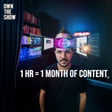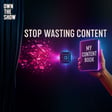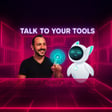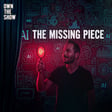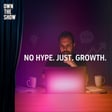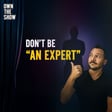Become a Creator today!Start creating today - Share your story with the world!
Start for free
00:00:00
00:00:01

Content Is No Longer King. This Is.
Want to start a podcast? Find out if it's right for you: https://aidrivenmarketer.com/pod
In this AI marketing podcast episode, Dan Sanchez and Ken Freire declare that the old king of marketing—content—has been dethroned. The new king? Original ideas. As AI makes it easier than ever to produce content, it’s originality that sets creators and marketers apart. This episode dives into how to uncover, evaluate, and sharpen your own original ideas to build authority and solve real problems.
My Favorite AI Tools
- Tella - https://danchez.com/tella
- High Level - https://danchez.com/highlevel
- Zencastr - https://danchez.com/podtools
- n8n - https://danchez.com/n8n
Resources Mentioned
- Ghost blogging platform - https://ghost.org/
- Wedgwood - https://www.wedgwood.com/
- April Dunford (Positioning book) - https://aprildunford.com/
- Andy Raskin (Strategic Narrative) - https://andyraskin.com/
- Pink's Windows - https://www.pinkswindowservice.com/
Timestamps
- 00:00 — Content is dead; originality is king
- 01:45 — Avoid random ideas: start from real problems
- 03:40 — Seven ways to make an idea unique
Lived experience
Earned expertise
Synthesis of disciplines
Point of view & values
Constraints as creativity fuel
Taste and curation
Iteration speed - 21:53 — Why podcasting is ideal for sharing ideas
- 22:10 — How to take inventory of your ideas
- 26:05 — How to refine and sharpen your ideas
- 31:02 — The ultimate test: who has it worked for?
- 32:01 — Five-part framework to test your idea's strength: True, Helpful, Transferable, Repeatable, Sharpened
- 34:36 — Call to action: start your inventory
Would you like me to move on to writing titles next?
Transcript
Intro
00:00:05
Dan Sanchez
You've heard it said that content is king, but I'm here to tell you today that the king is dead.
00:00:13
Dan Sanchez
And AI killed it. Gosh, we've been hearing that forever about content being king. But I'm telling you today that there is a new king. Yes, it's still kind of content, but let's be honest. Like AI is making content easier for anybody to create, whether it's music, video, write the written word, even original research.
00:00:34
Dan Sanchez
AI can do deep research reports in 30 minutes and actually get them published quickly. And they're getting more and more accurate and better and better at its style and the way it presents it all the time. So what's actually king now?
00:00:48
Dan Sanchez
original ideas. Yes. And that's what we want to cover and help you understand how to find original ideas, how to take inventory of where your ideas are and help them help you understand what's actually unique about them, and then actually show you the process for making good ideas great.
00:01:07
Dan Sanchez
So welcome back to the AI Driven Marketer. I'm Dan Sanchez, and I'm joined by my co-host, Ken Freire.
00:01:13
Ken Freire
yeah Yo, yo! Long live the king!
00:01:17
Dan Sanchez
And we're back on our series around Own the Show, which, of course, we are going from pod to book on this one and through the month of November. It's very exciting. And today, we're actually tacking through what we can do with the ideas we already have and to find new ideas, of course. Last chapter slash episode, we talked about how to find problems because all good problems are are like essentially the the starting point for good ideas because we don't want to just come up with the ideas out of nowhere.
00:01:45
Dan Sanchez
Shoot, I remember a Shark Tank episode where some inventor thought he had a great idea for butt patch, flat like light up butt patches. Yeah, like the patches you would normally sew onto a jacket. He made them just for the flap of your butt patch, like your jean pocket.
00:02:02
Dan Sanchez
And they they would like light up. And i'm like, yeah, because that's what we all need is butt patches.
00:02:04
Ken Freire
wow
00:02:08
Dan Sanchez
You're like, they he got laughed out of there. But that's that's kind of what you do. Like just random ideas we come up with are unless we actually tie them to a problem.
00:02:18
Dan Sanchez
So we're assuming that all the ideas you're coming up with and taking inventory are tied to problems. Unlike that poor entrepreneur on Shark Tank, that we're actually going to find something to make them relevant and unique, but let's talk about what actually makes a, I, an idea unique because oftentimes I think we can become a little bit romantic about what makes things unique.
00:02:41
Dan Sanchez
you know, especially if you're like a four on the Enneagram, you're like, I've listened to bands no one's even heard of yet. You know, you're like, so what makes them actually unique? I have a whole list here of things that can make ideas unique, but most of the time, like there's really no truly original ideas, but they've been, that's been true for thousands of years, right? I mean, was it King Solomon said that there's no
00:03:05
Ken Freire
There's nothing new under the sun.
00:03:06
Dan Sanchez
Nothing new under the sun, right? Ecclesiastes. So that's kind of always been true, I suppose. It seems funny for them to have said that back then, knowing all the new stuff we have today. But I think that'll probably be true even thousands of years from now. Maybe in eternity, we'll be looking back today and be like, oh, they didn't know nothing.
00:03:23
Dan Sanchez
you know So let's go through them one by one. I got a whole list of them and it's good to take inventory of them so you actually know what you're looking for when it comes to looking at your own ideas or even trying to hunt down new ideas that you can mark as your own.
00:03:40
Dan Sanchez
The first one is lived experience. That's your, essentially your personal history struggles and context filter. The way you filter ideas in a way that nobody else can duplicate because it's coming through you.
00:03:54
Dan Sanchez
While I have an example here, Ken, can you think of anybody like who's presented or taught you ideas? That's like, they're the only ones that could really teach it.
00:04:03
Ken Freire
Yeah, I mean, i'm I'm thinking of a mentor that we had that he mentored us in leadership development, right? Where he had so many lived experiences of almost dying, losing his fiance, his his late wife passed away.
00:04:19
Ken Freire
And all those experiences led him to a way of how he led people that greatly impacted me in the way I lead today.
00:04:27
Dan Sanchez
That's right. I even remember his experience of like how his dad used to say UGJ, use good judgment, as like an acronym, and that became a whole lesson for him.
00:04:32
Ken Freire
Yeah.
00:04:36
Dan Sanchez
ah'm like That's a unique content that came through him his dad just saying that to him.
00:04:40
Ken Freire
Yeah, exactly.
00:04:41
Dan Sanchez
But now he has a whole teaching on it. He's got a lot of those. It's funny because that's a guy who actually thinks he doesn't have any unique ideas, even though he's like bleeding out ideas all the time on leadership development.
00:04:51
Ken Freire
a
00:04:52
Dan Sanchez
I'm thinking of like Dave Gearhart's book on being, having a founder brand, which is interesting because like founders have been creating personal brands and building whole companies off of the back of brands for and at least a few hundred years.
00:05:06
Dan Sanchez
Right. You think of like Josiah Wedgwood, who, if you're in the UK, you're familiar with Wedgwood, but in the, in the U S it's a very well-known like a glassware and a plates and bowls and all those vases over in the UK.
00:05:25
Dan Sanchez
But like that's a company that started in the 1700s. It's still around today. You can go to Wedgwood.com and buy some bowls and yep.
00:05:31
Ken Freire
Wow. That's awesome.
00:05:34
Dan Sanchez
Founder brand. But Dave Gearhart started founder brand as a book, right? And he, nobody had really caught a codified, like what being a founder and leading with your personal brand is, but he had done it himself as specifically for B2B in a really strong way and actually wrote the book on it.
00:05:50
Dan Sanchez
So like nobody else had codified it. Nobody else had talked about it, even though it had been done multiple times. He's the one who actually wrote the book on founder Brandt's The next one is earned expertise. And that's repeatedly solving real problems that gives you insights and and only that only show up through like putting in so many different reps.
00:06:08
Dan Sanchez
For this one, i I learned how to do like online marketing and essentially took the like SaaS tech playbook. And I remember having earned expertise when I'm coming to higher ed where they didn't know any of that stuff.
00:06:21
Dan Sanchez
like Higher ed's still in the place of like buy a list from all the people who took the s sat and then just send brochures to them like direct mail uh and hopefully you can generate them actually reaching out to you but back in the day it was actually a new thing to bring like oh no like do facebook ads and then draw do do inbound playbooks you know get lead magnets and nurture sequences get them to actually then request information and then we'd follow up with sales and then you know that was the playbook where he ran at bgu
00:06:35
Ken Freire
Yeah, it's exhausting.
00:06:54
Dan Sanchez
but it wasn't through putting in a lot of reps myself, on a totally different playbook. Uh, the next one is synthesis, like unique ideas that come from different, uh, disciplines and then combining them in the unique ways.
00:07:08
Dan Sanchez
Like you were a carpenter and you came into marketing and had something unique. and thats I just kind of made that up, but, uh, I know you got one on that.
00:07:16
Ken Freire
Yeah. and Well, yeah. Well, one of the things that i was going to think about is people who can take a real complex point of view or complex idea and boil it down to something that can be cross-functional is massively useful.
00:07:33
Ken Freire
And I think the simplest one actually is when when marketers jump into sales or sales jump into marketing. Right. Because you have all these ideas, like, say, going to use myself from sales into marketing.
00:07:46
Ken Freire
Lots of times marketers have these grandiose ideas. And I'm like, my question is always like, well, how is that going to generate leads? How is that going to grow the brand? How is that going to close deals? Right. Like, I'm constantly thinking that way. So I'm only looking for marketing tactics or strategies that like move the needle forward.
00:08:05
Ken Freire
Sometimes there's great marketing ideas out there that I'm like, those are good, but it doesn't do anything. So it's just fun that I'm like, let's avoid those for for the time being. There's a time and place for those.
00:08:17
Ken Freire
But that's how I think about synthesis is just like you're able to constantly figure out what are those things that work really well for other industries or other fields.
00:08:27
Dan Sanchez
And there's always, i feel like there's a number of different marketers who had a sales background, gotten to marketing, figured out like, oh, there is some really good things in marketing here, but had a unique perspective to bring to bring to marketing because of their background in sales.
00:08:36
Ken Freire
Yeah.
00:08:42
Dan Sanchez
And we're able to take some sales ideas and make them marketing, right?
00:08:45
Ken Freire
yeah
00:08:47
Dan Sanchez
Another example I have is April Dunford, who wasn't in positioning. Now she's no she's known for her book on positioning. But she was in product marketing before and brought her storytelling prowess from product marketing over into positioning in order to teach that unique and compelling way. And now she's one of the most famous people when it comes to positioning.
00:09:06
Dan Sanchez
Another one is point of view, like you're like taking ideas and then solving problems and finding new ideas through your stance, values and judgments that give shape and make your ideas unmistakably yours.
00:09:22
Dan Sanchez
We all come from different places. We all have different stances or viewpoints on the world. And I find that this is probably one of the best places to start. If you don't know where to start, like find out what's true about you. Remember we talked about like how important core values are in the age of AI. It's like one of the few things that AI can never do is have core values.
00:09:40
Dan Sanchez
So what does that say about the tactics you're actually solving for? you might be solving something already differently and and in a different way than most of the industry because your values say, well, in in this light, I think this is true. So we're going to solve it this way. And it works.
00:09:56
Dan Sanchez
It's working in a different way than than what was done before. An example of this is Andy Raskin, fantastic guy who had kind of like a unique take on how stories can actually drive strategy, which was kind of stories were kind of like light and fluffy ideas. And then he found out, he's like, yeah, but If we can have a unique story, not only does it drive internal alignment because everyone is telling the same story and story is often a shortcut for values and and how we actually help the customer, but it creates unique way of positioning yourself in the environment
00:10:29
Dan Sanchez
in the marketplace too, because if all your prospective buyers understand your story, then that's a unique hook to make, I don't know, make it consistent, make it more consistent and helps drive all your marketing and sales.
00:10:41
Dan Sanchez
If everybody understands that one story. So he calls it the strategic narrative, but he had a point of view around that bringing stories into strategy.
00:10:50
Ken Freire
Yeah. You know, I even think about how this affects people when they're posting on social media, like all the things that we were talking about in the previous chapter, because values play a a great deal. I'll give you a great example.
00:11:03
Ken Freire
Just the other day, i saw someone post how they were using AI to automate all their messages. And they're like, look how we just closed this deal to book a call.
00:11:14
Ken Freire
And I'm like, wait a minute, you just showed the whole world how you are lying. Because in the comments, these they took a snapshot of their conversation. the The potential client was like, hey, is this AI? And they're like, no, this is a real person. It's me, you know?
00:11:30
Ken Freire
and But then in the actual post, they're like, this was all done by AI. It wasn't a real person. And I'm like, whoa, you you are just showing that you don't value ethics or integrity.
00:11:43
Ken Freire
And this is where you can come across and be like, hey, I do value those things and call them out. I actually call them out because I'm like, it's one of my biggest pet peeves when you start lying to people. And like...
00:11:53
Dan Sanchez
A pet peeve, you know. It's cool for you, but I'm just going to call it out.
00:11:58
Ken Freire
No, I'm just going call. I'm just like, dude, it's more than a pet peeve.
00:12:00
Dan Sanchez
Yeah.
00:12:02
Ken Freire
It's a conviction. Like, don't lie, you know, like, but this is where your point of view, your values, your judgments, your belief systems really kick in because you want to work with people you trust.
00:12:03
Dan Sanchez
Yeah, yeah, yeah.
00:12:13
Ken Freire
Right. And I remember messaging that person because I was thinking about using their their product. And I said, hey, FYI, I will no longer use your product because you guys are clearly showing me what you value and we are completely misaligned.
00:12:28
Dan Sanchez
A lot of our values actually show up in this book. And I've had people actually tell me like, hey, like, are you a Christian? Partly because I'm calling things learn in the light. And that just sounds like a Christian thing to say.
00:12:38
Ken Freire
Ha ha ha.
00:12:39
Dan Sanchez
But other parts, it's kind of like where the reason why we say go be humble and show up as a student is because of our faith background. Like we really value humility.
00:12:49
Ken Freire
yeah
00:12:49
Dan Sanchez
But then how do you build authority while also showing a high level of humility? That's why we have the whole being the student thing. So we really believe that being humble is the ultimate form of, don't know, it's one of the ultimate principles of of living, whether whether you are a Christian or not. like Humility is high. We highly value it across the board. Yeah.
00:13:12
Dan Sanchez
which is why we think that truth plays out. Even when you're trying to become an authority, you don't need to be prideful. And that I think pride is actually going to lead to a fall. It's going to lead to you not being an authority. So going being humble is actually the true path to become an authority the right way, the long-lasting way.
00:13:29
Dan Sanchez
And that's our point of view actually coming through in this very book.
00:13:33
Ken Freire
Absolutely. All The next one is constraints. This is about limiting and forcing sharper ideas. So pushing yourself towards more creative and uncommon solutions.
00:13:44
Ken Freire
So I think a lot of this is just like how you talk about certain things. You're not broad. You're very specific in what you're talking you're talking about consistently. Dan always has to reel me in. He's like, what what do what is your angle on stuff? And I'm like, well, I want to talk about this, this, this, this. And they're like, hey, your customer not going to know what you stand for if you're talking about 50 different things.
00:14:06
Ken Freire
You should have three to five pillars. So constraining yourself to what people should know about you.
00:14:14
Dan Sanchez
This is a fun one. I find that content creators use this one all the time to help their content stand out and become unique. So they'll be like, you know, I did something big, but only on a dollar a day, you know, yeah or something crazy, or it's the other way.
00:14:25
Ken Freire
yeah
00:14:27
Dan Sanchez
It's maximalist. I spent a million dollars on a piece of paper, you know, like whatever it might be. But I had an idea one time that became a unique idea and I find more and more people are using it. i I just did it within an organization, but we we had a constraint. Like I needed a cheap way to like put essentially flyers in the hands of a lot of the customer current customers to give to prospective customers, essentially to recruit.
00:14:51
Dan Sanchez
But I needed an easy way and I was like, well, what if we did it as like business cards? Because business cards are super cheap. You could print thousands and thousands of the suckers for nothing. And they're easy to distribute because they're small.
00:15:01
Dan Sanchez
So that's what we did. We did these like little business card size flyers and those became handouts that people would use for the organization. So like a lot of times constraints lead to some really unique ideas and you can apply them to anything. What's the smallest of or biggest biggest version of this specific paid ad strategy you use if you're in paid marketing uh if you're doing earned media like whatever it is what's the least amount you can get away with what's the most amount you actually end up finding unique ideas there the next one is taste or curating high quality inputs to refine your sense of what good looks like making your output stand out
00:15:39
Dan Sanchez
A great example of this I saw with a whole business down in Austin was someone took a boring business and then made it sexy again.
00:15:47
Ken Freire
Mm-hmm.
00:15:47
Dan Sanchez
Not again, it was never sexy, but they made it cool. And that's Pink's Windows Cleaning Company. Go Google it, Pink's Windows. But they essentially like some guys just wanted to start a little side hustle. So they started cleaning windows, but they dressed up in like this kind of They branded it well of the design and the logo and the, like the dress attire they all wore with like this, like vintage 1950s flavor. And they all have these, they all wear pink Converse is kind of the reason for the pink.
00:16:15
Dan Sanchez
but they made it cool to the point where people in Austin started just wearing their branded hat. And then it started spreading from there. Now they have multiple locations and now it's become a whole trend to just take boring businesses and make them cool.
00:16:26
Dan Sanchez
Yeah.
00:16:27
Ken Freire
yeah
00:16:27
Dan Sanchez
But that's an idea of like using taste to make something totally unique because now making boring businesses cool is a unique idea on the table for startups going and finding and disrupting markets with that.
00:16:39
Ken Freire
Dan, do you think for marketers specifically for this one, there should be a little bit of caution? and And the reason why i think that is like, they always want to make things look so good that they never actually execute on a project or on an idea.
00:16:57
Dan Sanchez
I actually find that marketers, they do want to make things look good, but they're actually, they're actually don't have great taste because they generally copy their competitors more often than not. Like if you look at all the tech websites, these are pretty, these are really highly paid marketers to working in the tech industry.
00:17:11
Ken Freire
Yeah, they all look the same.
00:17:15
Dan Sanchez
They all look the same. Yeah.
00:17:17
Ken Freire
Yeah.
00:17:17
Dan Sanchez
You know, i'm like, so that's where leaning into a designer, like I, gosh, I was even at a college, a college marketing conference I was speaking at.
00:17:29
Dan Sanchez
And this tiny little college was crushing it because they let some of the Gen Z take over design and they were standing out through the way it was one of the ways they were crushing. It was through tastes. Like, of course, the Gen Z designers were having a field day making it different.
00:17:43
Dan Sanchez
As a marketer, I'm like, but because they let the customer actually help push it in a direction, because we were millennials. So it's like, it's we didn't really know what was trending with Gen Z at the moment.
00:17:55
Dan Sanchez
It worked out really well. And they were able to grow because of it. Oftentimes, yes, marketers can get a little bit lost in the weeds of brand and just counting on brand to save them. And I'd say branding is big, but at the same time, you do have to actually generate leads. You do have to generate sales. You can't just like rest on that alone. So I think you're right.
00:18:18
Ken Freire
Yeah, that's and that that's interesting to think about like, marketers and even business owners, right? We will just copy what the other person is doing because of fear, like, well, if I stand out too much, people won't like me. But here, you're actually saying if you could do it in a well polished way.
00:18:36
Dan Sanchez
that's drastically different. That's what makes it unique.
00:18:39
Ken Freire
Yeah.
00:18:40
Dan Sanchez
it's not just It's not just taste by your peer standpoint. its It's taste in a different level.
00:18:46
Ken Freire
Yeah, that's awesome. Okay. the The last one is iteration speed. So this is just about how quickly you can move through experiments, give feedback, and accelerate all all your ideas. I mean, in some ways, this is what we're doing with the podcast, right?
00:19:02
Ken Freire
We're recording every day. And it's not like a 5-10 minute thing. It's 30 minutes. We're getting feedback. We're also looking at it just to be transparent. Like, how many leads do we get by doing this, right?
00:19:12
Ken Freire
We're constantly... testing new things out. You're always experimenting on a new tool, right, and sharing your feedback and ideas on that. So it's a beautiful way to start sharing your unique ideas.
00:19:27
Dan Sanchez
Another example of that is just McDonald's, right? It's kind of like nobody thinks about how getting burgers used to be very slow, but McDonald's made it fast. And that was one of the things that put McDonald's on the map as a franchise.
00:19:39
Dan Sanchez
But oftentimes we have ideas that are actually faster than market standards. And if we have ideas that can go faster, speed is a quality in and of itself that is very attractive. And as you can build a whole business around just even just one component within some kind of solution being way faster can be a whole business in and of itself sometimes.
00:19:59
Ken Freire
Yeah.
00:19:59
Dan Sanchez
So those are a bunch of different ways you can lead ideas to being unique. <unk> It's not exhaustive. There's probably more ways to make unique ideas, but oftentimes, again, ideas don't have to be 100% unique.
00:20:15
Dan Sanchez
They could just have a unique spin, a unique angle, a new personal takes, point of view, a taste, speed, some... things, some little tweak that just makes it unique enough to be different from everything else.
00:20:28
Dan Sanchez
And having something that's different, but also equally helpful is the goal. Again, it's got to be attached to solving one of your prospective buyers problems to make it relevant.
00:20:39
Dan Sanchez
But now that we've kind of covered like all the different unique ways that it can be unique, I do have to mention one of the best ways to communicate all these unique ideas that you have is a podcast. Come on, you had to know I was going to say it sometime.
00:20:53
Ken Freire
That was a good segue. That was a good segue. I like the, the, the, the soft pitch there.
00:20:58
Dan Sanchez
So if you've ever wondered about starting your own podcast, you've ever been on the edge, you should go take our assessment. It's over at AIDrivenMarketer.com slash pod and find out if a podcast is right for you.
00:21:11
Dan Sanchez
I feel like anybody who essentially sells with their expertise, coaches, consultants, even tech companies who are leading in a new category, anybody who's really selling ideas,
00:21:21
Dan Sanchez
and then has a service or product that comes with those ideas, really should start a podcast. That's the best way to actually get your ideas out into the marketplace. Kind of like we're sharing this whole book via podcast. There's a reason for it. It's one of the easiest and most efficient ways to do it.
00:21:37
Dan Sanchez
but moving on from the podcast sideway is we need to be able to take inventory of ideas. It's not enough just to have unique ideas. We actually have to go and kind of scour them. I find that most experts, especially people working in coaching and consulting, usually already have like a collection of ideas.
00:21:53
Dan Sanchez
They just haven't actually pulled them into a document and made a bulleted list of them. And they're usually hiding in plain sight. Ken, what are some of the ways that people usually can find some of the ideas they already have out there?
00:22:05
Ken Freire
Yeah, I mean, I think the first one was just things you keep explaining to people. Like, do people come and ask you the same question over and over and over again? That should be, you should take note that that's one of the ways that you have an expertise or unique angle on something that you should share.
00:22:22
Dan Sanchez
What are the questions people are asking? Even unique ones. I always find it so helpful to be asked questions all the time. I actually always say yes to as many podcasts as I can be on, even if there's like zero audience or I'm the first first person to be on a podcast.
00:22:35
Dan Sanchez
Because sometimes a question will unlock a new idea in me that I didn't even know I had. They ask a question, I give an answer, and I'm like, hold on, let me write that down. That was an awesome take.
00:22:43
Ken Freire
Yeah.
00:22:45
Dan Sanchez
I'm amazed by what I just said. That just happens. So questions are also a good place good place to find unique ideas. Another one is actually work foes you've already optimized because the standard way annoyed you.
00:22:58
Dan Sanchez
Sometimes you learn something from like when you, especially when you're new, you're learning like how to do the thing that you do.
00:22:58
Ken Freire
Yeah.
00:23:04
Dan Sanchez
You learn it from a boss. You learn it from a training. And then eventually you got out in the real world and you used it and it worked, but it got annoying to you and you fixed it. That fix, that's probably an idea. You probably have a whole collection of them.
00:23:17
Dan Sanchez
What are they? Write them down.
00:23:19
Ken Freire
Yeah, I think another one is in meetings that you actually have had with people. There's going to be tons of ideas. I've actually been doing this lately is every meeting that I come out with, I said, what was an idea that just came to fruition from that?
00:23:34
Ken Freire
And it could be a marketing conversation, a sales conversation, a coaching conversation. It's just anything that I'm like, ooh, that sparked an idea. I literally take that and I copy and paste it. You know, sometimes I use ChatGPT and be like, hey, was there a unique idea that came out of this?
00:23:48
Ken Freire
And they give me something.
00:23:48
Dan Sanchez
Yeah. Yep.
00:23:49
Ken Freire
I'm like, great. Now I'm going to use my own words. I'm not letting ChatGPT write it. I'm going to use my own words to craft that idea and flesh it out a little bit more.
00:23:59
Dan Sanchez
dang That one's really good. I wish I would have thought of that one. Ken, you got it. Just give ChatGPT your content, maybe even your call, your your consulting calls or your coaching calls or even your sales calls.
00:24:13
Dan Sanchez
So like, what are unique ideas if I shared here? I have it later on in this podcast, like ways to validate ideas, but like asking ChatGPT if it's unique, it's really good at figuring that out. As many times I thought I had a unique idea and ChatGPT is like, nah, someone thought of that already.
00:24:28
Dan Sanchez
other thing Other places you can go hunting for ideas within your own work environment is your notes. Where in your notes? I'm not thinking, I'm like, okay, obviously just go take your whole Notion database and feed it through ChatGPT.
00:24:41
Dan Sanchez
I think you could do a deep research dive on that now. Like I think you can do deep research at Notion as, and wish you could do this with like Evernote and all the other places, but I'm pretty sure Notion has an integration. You can do deep research. It'll just scan the whole database and mine for unique ideas.
00:24:57
Dan Sanchez
Shoot, Gemini just added the ability for you to do a deep research component or deep research search in your Google Drive.
00:25:05
Ken Freire
oh man
00:25:06
Dan Sanchez
So I'm like, dude, this like that's going to be a game changer for a lot of people because you could be like, Gemini, go find all my most unique ideas. in my Google Drive and then validate whether other people have shared them or not.
00:25:18
Dan Sanchez
You know, it's all there.
00:25:19
Ken Freire
That's pretty huge.
00:25:20
Dan Sanchez
You have it all written down if you've been writing down in Docs or in Notion or someplace. And the last one I want to share is just frameworks you've created because nothing off the shelf worked. I think we all do. All professionals do. We read a book and we're like, that was good, but I found that this slight tweak worked better. That s slight tweak might be a really unique and original on idea that you want to use to build up your authority.
00:25:45
Ken Freire
Yeah.
00:25:46
Dan Sanchez
So let's talk about how to refine the idea. Again, what's the first step?
00:25:50
Ken Freire
Yeah, the first one is like actually doing the work. Don't ever let it just go from a theory to idea. It's got to have experience. Experience is always greater than the theory.
00:26:02
Dan Sanchez
That is kind of the main step. Like if you don't do that, then it's not really there. I will say that you there is are a few times where I have, and I've seen others post an idea, but you better make sure to like, let people know like, hey, hypothetically, what if,
00:26:17
Ken Freire
Yeah.
00:26:18
Dan Sanchez
it were like this. I saw a whole company got started that way. Some guy was so mad about WordPress sucking and they like, well, tech, he was a technologist too, he's like a developer.
00:26:29
Dan Sanchez
He's like, it should work like this. And he took like some modern developer standards and JavaScript and writing with Markdown and a couple other unique ideas. He's like, what if we had a thing that was like this? And his post went wildly like viral.
00:26:42
Dan Sanchez
And he, then he did a whole Kickstarter campaign and raised a lot of money and he did, it was successful. He built the whole other platform called ghost based on a what if post. So it's like, you can throw them out there, but generally if you really want to push the idea,
00:26:58
Dan Sanchez
you need to have at least done it yourself and prove that it works, at least for you. But the next one is actually documenting what you did. Because it's one thing to do it. It's another thing to document it.
00:27:10
Dan Sanchez
Ken, I've met with people over and over again. like Usually in the process of helping people understand how to build custom GPTs, they don't think they have processes because they've never actually documented it.
00:27:17
Ken Freire
Yeah.
00:27:20
Dan Sanchez
but they do. I'm like, trust me, you're doing this research the same way every every time. Tell me, like what do you first do to do this? Okay, and then what's the next step? And what's the next step? People don't take the time to document and actually write down their process. So they think they're just making it up or it's just skill.
00:27:35
Dan Sanchez
And I'm like, no, it's not skill. You have a process you follow every time. You could delegate this to AI.
00:27:39
Ken Freire
Yeah. And and it actually what I found is that once you start documenting it, you can actually see, oh, I can make this a little bit better and refine it and and work through it.
00:27:48
Dan Sanchez
Yes.
00:27:51
Ken Freire
I think another one is actually that goes along with documenting it is teaching the work to others. Right. Like you're either documenting it and sharing it with other people. That's delegation.
00:28:02
Ken Freire
But you're just teaching everybody what you're doing. I mean, even as we've been talking about this podcast or this whole thing, we've been teaching other people. There's several people who are now DMing me. They're like, dude, I see you're doing this book. How's it going? What's happening?
00:28:16
Dan Sanchez
Yeah.
00:28:16
Ken Freire
What are you learning? And I'm like, oh, this is what I'm learning. And then i'm like, sweet. I just create came up with another but LinkedIn post. And I just take that and just make it into a LinkedIn post. just constantly teaching people and people will start to come out of the woodworks when you're doing that.
00:28:32
Dan Sanchez
Yeah, there is something about teaching that really solidifies it. i think i like I think I get, i obviously I don't think, I actually get a ton more out of homeschooling than my kids do. I know my kids learn too, but as I go through history and science and and teach I teach them the Bible, like I'm getting way more out of it because I'm teaching it.
00:28:44
Ken Freire
Oh, yeah.
00:28:51
Dan Sanchez
I'm now reading it through and explaining it to them and going through it. I'm like, oh my gosh. If you haven't actually taught your kids like history or something, it's so rewarding because you get to learn a lot in the process.
00:29:03
Dan Sanchez
But even teaching marketing, been teaching marketing now on LinkedIn, just through post after post, you post once a day, every day, three, like you post 300 times a year, man, that's, you end up learning a lot through the process of just posting and teaching.
00:29:14
Dan Sanchez
Yeah.
00:29:15
Ken Freire
Yeah. I mean, can I give a quick example on this?
00:29:16
Dan Sanchez
Yeah.
00:29:17
Ken Freire
Like two weeks ago, and I think I sent you a message on this. i I tried. I was like, hey I'm going to post three times a day on LinkedIn. It was extremely aggressive. You know, did it every day.
00:29:27
Dan Sanchez
You did it every day. Yeah.
00:29:29
Ken Freire
Yeah. There was several automations and setups and you know all that stuff that we've been talking about. But it gave me a lot of data to all of a sudden say, oh, what's working? What's not working? What people are liking? What people are not liking?
00:29:43
Ken Freire
And it was super helpful for me to to do that because I'm like, okay, now I can take a step back and refine those things to hopefully make them better.
00:29:53
Dan Sanchez
yeah There's something about volume in and of itself that just is a much better teacher, right? So you just create a faster feedback loop and you can learn quicker. even Even in posting this series every almost every day this month, of course, reach has gone down because people are like picking and choosing which episodes they want to listen to. And I'm like, i don't really care.
00:30:13
Dan Sanchez
There's something about posting a lot of something that this gives you a faster feedback loop so you can learn and do something.
00:30:17
Ken Freire
Yeah.
00:30:18
Dan Sanchez
Yeah.
00:30:19
Ken Freire
Which is the last thing that we're going to talk about, about taking inventory is refining the work, getting that feedback.
00:30:20
Dan Sanchez
Yep.
00:30:26
Dan Sanchez
Ultimately, as you're trying to create unique ideas, doing the work is the first most important. I think documenting is important. Teaching is important. The next one, and this is the one that really becomes the huge qualifier, is how many other people have you used? Has it worked for?
00:30:41
Ken Freire
Hmm.
00:30:41
Dan Sanchez
The amount of people that your idea has helped solve the problem for becomes the barrier for how, becomes the indicator, in my opinion, of how good the idea is.
00:30:52
Dan Sanchez
And then lastly, like to get greater numbers, it's like some some ideas are good and they'll work for people who are exceptional, but does the idea work for people who are on the other side, who are beginners or who are not exceptional?
00:31:02
Ken Freire
Yeah.
00:31:05
Dan Sanchez
Yeah. And it still works. Like that becomes the ultimate test. Like we took someone from zero to hero with the idea. Now, not all ideas need to be that good, but it is a good adventure benchmark in my opinion. Like how many people has this helped? And that's where like testimonial walls become really helpful because it's proven that the idea has worked over and over again, right?
00:31:23
Ken Freire
Yeah. so So Dan, if we're taking inventory and all this, right, people start creating a list of all these ideas. How do they know that it's unique and not just good, right? Where it's like, okay, this is actually going to be a strong idea for them.
00:31:40
Dan Sanchez
So I find that there's five criteria. You want to see that it's true, that it's helpful, that it's transferable, that it's repeatable, and that it's sharpened and actually tested through feedback.
00:31:54
Dan Sanchez
So let's unpack each one of those. True, like it actually has to line up with your values and with your actual experiences. That's why doing it yourself is so important. helpful. It actually solves the real problem that you're attackling tackling. Again, one of the most helpful.
00:32:09
Dan Sanchez
That's why we even started with that one. It's like, if it's not actually helping some kind of problem, then it's not really useful. Transferable. Others have to be able to use it. You have to be able to teach it in such a way that you can pass the idea and and someone can actually grab it and run with it.
00:32:26
Dan Sanchez
but it has to be transferable. I've, there's been times where I've shown people things and I'm like, Oh, this is how it works. And then you end up like that meme where the guys like got the big plot charts behind him.
00:32:34
Ken Freire
Yeah.
00:32:34
Dan Sanchez
And he's like, this is the system. I've mapped it all out. You know what meme I'm talking about? Everybody has to be transferable.
00:32:38
Ken Freire
i
00:32:40
Dan Sanchez
Otherwise people are like, Oh, that's nice. And then repeatable. It can't just be a one-time thing that worked for you. That's like the most common thing we see out, especially in Mark is across marketing.
00:32:50
Ken Freire
yeah
00:32:50
Dan Sanchez
like, oh, look at this hack. I was able to 10X my business and in three days. You're like, okay, even if it's true, the chance that that's going to like work for others is low, to say the least.
00:33:04
Dan Sanchez
So is it repeatable? And then sharpened. Have you actually iterated on this, tested it, done it multiple times for yourself, taken notes, refined the notes? That's why you're documenting it so important. So you can refine and then took it through the process with multiple people, refining it every single time in order to make it something that's really sharp and has been honed and all the variables taken into account to make it an actual sharp idea.
00:33:26
Dan Sanchez
So those are kind of the the five things that you want for a unique and helpful idea.
00:33:32
Ken Freire
I love it. and And that's where the more you do it, the more you can actually start to see, wow, people want to learn from me.
00:33:42
Ken Freire
People want to grow with me. which is something that you don't actually think about most of the time. You just think, oh, cool. This is just a idea that I threw out there. It's going to work. But now that's where you're getting true followers, where people are excited. They're like, well, I wonder what Dan's thinking about this. Or I wonder what, you know, so-and-so is thinking about that.
00:34:04
Ken Freire
That's the beauty of making a strong idea walking through these five criteria so memorable.
00:34:14
Dan Sanchez
So if you've listened to this whole thing or read through the whole chapter, now I'm sure some of your best ideas are probably coming to the surface. You're already thinking about a few. Go and take inventory of all the rest of them and come up with just a word doc. Come up with a bulleted list of maybe a half a dozen to a dozen of them.
00:34:31
Dan Sanchez
Because in the next episode, we're going to talk about how to package them in such a way that they can actually be like one of those things. They can actually be more transferable. Today, we want to find what's helpful.
00:34:43
Dan Sanchez
We want to find what's repeatable and maybe what's sharpened into what's true. But in the next chapter, I have a whole episode or whole chapter episode dedicated to how to make it more transferable, more and in in a nice packaged way.
![What’s Your Authority Score? [The 5-Factor Test] image](https://media.zencastr.com/cdn-cgi/image/width=112,quality=85/image-files/630c9f06819f8b3dba5fa460/cfbaccba-f587-45de-a41f-e2c99c15e2a5.png)
![The Audience Growth Engine [Full Framework] image](https://media.zencastr.com/cdn-cgi/image/width=112,quality=85/image-files/630c9f06819f8b3dba5fa460/46b84fd1-e856-4687-9aee-6b4a7e0bc7ff.png)
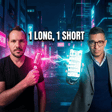
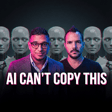
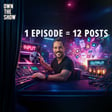
![The "Dream 100" Execution Plan [Google Sheet System] image](https://media.zencastr.com/cdn-cgi/image/width=112,quality=85/image-files/630c9f06819f8b3dba5fa460/fcd89374-76a4-4e58-a2e3-2bb7ddda4364.png)
